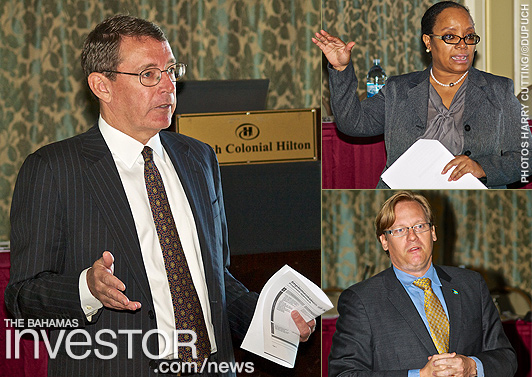| Source: Date: Updated: |
TheBahamasInvestor.com
Tuesday, February 4, 2014 Tuesday, February 4, 2014 |
Investment fund managers in The Bahamas were briefed Monday on the intricacies of a European Union (EU) directive that could seriously affect the growth of the assets management industry.
The Alternative Investment Fund Managers Directive (AIFMD) bans unregulated attempts to raise funds for investments, or market offshore funds in EU member countries.
The Bahamas Financial Services Board (BFSB) in conjunction with the Ministry of Financial Services, the Securities Commission of The Bahamas and Ernst & Young hosted the industry briefing yesterday at the British Colonial Hilton in Nassau.
The industry has only just begun to dialogue publicly about the EU directive, which took effect last July.
Essentially, AIFMD imposes greater reporting and compliance burdens on foreign investment managers– even more than what’s required by the US Securities and Exchange Commission (SEC).
According to presenter John Sampson, executive director of financial services risk management for Ernst & Young LLP, when it comes to AIFMD “the devil is in the details.”
In his presentation to local financial service providers, Sampson told investment managers they could comply with AIFMD in one of three ways.
They could establish an EU manager and EU fund for all AIFMD compliance, or rely on the national private placement regime (NPPR). A third option is to cease marketing in the EU and wait for clients to come to them.
Each choice, says Sampson carried with it different implications for a fund manager’s fund-raising, compliance, reporting, compensation and tax structures.
In a highly-detailed presentation, he outlined the advantages and disadvantages of each option.
“The Bahamas is doing exactly what everyone else is doing, trying to understand and work through what the EU regulators want,” Sampson told The Bahamas Investor.
“If you’re not going to ever market in the EU, then it doesn’t make any sense to comply. If you already have investors there and you anticipate having additional investors, then you have to comply.”
Fund managers who want to obtain or retain EU marketing access are being urged to explore their current level of business and the future availability of business in Europe.
No statistics were readily available on just how many fund managers are impacted.
“Each service provider is going to have to take stock of their own business and their prospects and determine where are their investors coming from, where are they marketing … They are going to have to make decisions on the basis of where they see business opportunity,” Aliya Allen, chief executive officer and executive director of the BFSB.
“What we’ve tried to facilitate through the Securities Commission, through the Ministry of Financial Services is to allow the private placement regime option to still be open for Bahamas funds and Bahamas fund managers so that they can make their individual determination as to whether they register or have to register with different countries in accordance with AIFMD.”
In the National Private Placement Regime (NPPR) model, non-AIFMD compliant firms could continue to sell their funds in the EU, providing they report to each national financial security regulator in each country in which the funds are marketed.
In this manner, one could bypass AIFMD as it relates to addressing compensation, risk management and some other requirements.
The downside is a fund manager could have to report to as many as 27 different regulators.
According to Mechelle Martinborough, legal counsel for the Securities Commission, The Bahamas has wrapped up phase I of AIFMD implementation, which required cooperation arrangements between The Bahamas and the EU and signing a tax information exchange agreement (TIEA).
Phase II runs from July 22, 2013, to July 2015 and results in either a passport regime, that is, unfettered access to EU marketing, or a private placement regime subject to certain requirements.
“AIFMD clearly is a very intense regime, something that seems on the face of it, to be put together by the European Union without any cognizant of ease of doing business,” said Ryan Pinder, Minister of Financial Services. “We are not alone as a jurisdiction in trying to work our way through it and understand it more.”
tblair@dupuch.com











